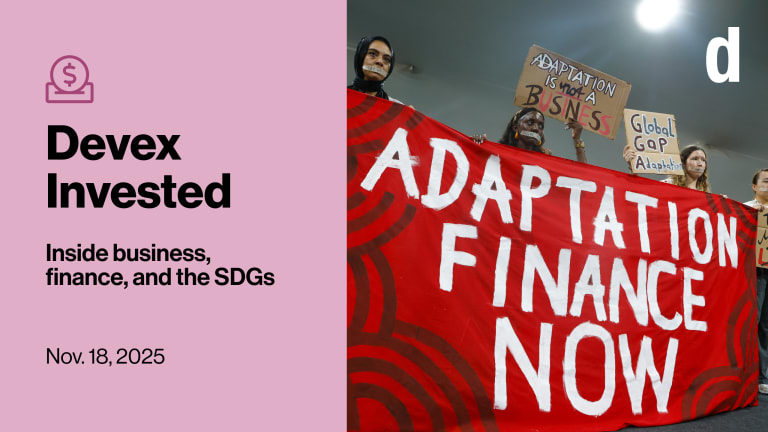
Many small island developing states are located in some of the world’s most disaster-prone regions, and because of their unique geographies — typically remote, isolated, and highly exposed — they are often disproportionately affected by climate change and natural disasters such as floods and cyclones.
Nearly one-third of the population of SIDS live on land that is just a few meters higher than sea level, meaning that extreme weather events and rising seas pose an imminent threat and even risk making some islands uninhabitable or wiped out entirely.
More from the Turning the Tide series:
► Bringing oceans into the climate fight
But these states often lack the financial resources needed to cope with — and tackle — the impacts of climate change.
Against this backdrop, how can small island developing states source the financing they need to enhance climate resilience? And what opportunities are offered by innovative funding mechanisms?
Innovative climate-resilience funding
SIDS can link innovative financial instruments with climate resilience agendas to invest more in building long-term resilience rather than short-term action. For example, funding climate and disaster resilience through a wider range of capital market instruments that fit within a sustainable finance umbrella — such as green, blue, and climate resilience bonds — can help SIDS build resilience.
These market-based climate finance mechanisms have been used in the past couple of years by some SIDS to mobilize funds to boost climate resilience and diversify their funding pools.
Green bonds have been used by Fiji to fund investments for climate change adaptation and mitigation. In 2017, Fiji launched the first emerging market sovereign green bond, raising $50 million.
Last year, blue bonds were used by SIDS such as the Seychelles to advance the countries’ blue economy and protect their coastal ecosystems. Furthermore, global environmental not-for-profit group The Nature Conservancy announced earlier this year plans to unlock funding of $1.6 billion for island nations’ ocean conservation by leveraging upfront philanthropic capital and blue bonds.
These states could diversify their funding mix further through a blended finance approach by using impact investing, debt restructuring, and grants for conservation purposes.
In 2016, for example, the Seychelles was the first country to restructure its foreign debt for climate adaptation purposes. This new debt conversion model forgives a proportion of the country’s debt in exchange for governmental commitment and investment in domestic marine conservation and climate adaptation projects. The $20 million debt swap freed up $6 million for the state to fund conservation projects.
Via debt restructuring, this innovative model mobilizes much-needed funding for investments that help develop more resilience for coastal communities. This is through funding island and coastal nations’ marine conservation efforts to protect nearshore ocean areas — including coral reefs, mangroves, and other ocean species.
Exploring other funding pools
For member countries of the Organisation of Islamic Cooperation, Islamic financing instruments have great potential and should be explored.
Instruments such as green sukuk — Shariah-compliant financial products that involve issuers funding environmentally friendly projects with the proceeds raised — have been used by the likes of Indonesia.
With a population of more than 260 million, the Southeast Asian archipelago launched the first sovereign green sukuk last year, which was oversubscribed — indicating strong market demand for such instruments.
Tapping the global Islamic finance market again this year, Indonesia issued two additional green sukuk with a total value of $2 billion, both of which were oversubscribed.
More recently, the Islamic Development Bank issued its debut green sukuk — worth €1 billion ($1.1 billion) — under its new Sustainable Finance Framework. Proceeds raised from the green sukuk will be used to fund a variety of climate change and green projects in the bank’s member countries — a group that includes a number of SIDS.
Some states, such as the Maldives and Bahrain, have issued sovereign sukuk. However, much still needs to be done to strategically tap the growing Islamic climate finance space to help build climate resilience.
Financially preparing for challenges ahead
A number of innovative financing mechanisms present an opportunity for SIDS to fund climate resilience efforts, but challenges remain.
Many of the SIDS lack the capacity to access and scale up these innovative funding tools, so capacity building is essential to ensure they are institutionally ready to take advantage of these mechanisms.
The Commonwealth’s Climate Finance Access Hub addresses this issue by deploying climate finance specialists to help Commonwealth member countries “navigate the red-tape and make successful applications for projects to mitigate and adapt to the effects of climate change.”
However, not all SIDS are part of the Commonwealth. This is where multilateral development banks can play a key role as catalysts for leveraging private sector finance for climate resilience.
These states can also consider creating their own international financial institution that can borrow on the international capital markets on their behalf, providing them with financing for climate adaptation and mitigation projects.
This will not be an easy task, but given that SIDS share similar challenges, such an institution could mobilize funding and accelerate resilience efforts by alleviating pressure on SIDS that lack existing institutional structures.
Visit the Turning the Tide series for more coverage on climate change, resilience building, and innovative solutions in small island developing states. You can join the conversation using the hashtag #TurningtheTide.









